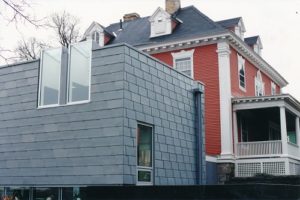
Clark University welcomes architect Julian Bonder, Deborah Martin, professor of geography, and Kristina Wilson, professor of art history, to start a discussion of how communities address painful legacies through memorial construction, entitled “Recognizing Painful Legacies through Memorial Construction.” The lecture will take place at 7:30 p.m. on Wednesday Nov. 18 in the Higgins Lounge at Dana Commons.
The renowned Memorial to the Abolition of Slavery in Nantes, France, a port from which hundreds of Atlantic slave-trading expeditions set forth, created by Bonder, will serve as the cornerstone of the discussion. The group will also discuss Bonder’s Holocaust related work and other memorials to mass atrocity.
Bonder was the architect for the Cohen-Lasry House, home to the Strassler Center for Holocaust and Genocide Studies at Clark University.
Read more about the Cohen-Lasry House.
Bonder teaches at the School of Architecture at Roger Williams University. A descendent of Ukrainian immigrants, Bonder escaped the Holocaust by moving to Argentina and growing up in both New York and Buenos Aires. He has given keynote addresses around the world, most notably the Fourth Annual Human Rights Conference in Lima, Peru and Denver in 2014.
The event is free and open to the public; a reception will follow. It is co-sponsored by the Graduate School of Geography and Department of Visual and Performing Arts.
For more information contact Sarah Cushman, academic program liaison officer, at scushman@clarku.edu.
Founded in 1887 in Worcester, Massachusetts, Clark University is a liberal arts-based research university addressing social and human imperatives on a global scale. Nationally renowned as a college that changes lives, Clark is emerging as a transformative force in higher education today. LEEP (Liberal Education and Effective Practice) is Clark’s pioneering model of education that combines a robust liberal arts curriculum with life-changing world and workplace experiences. Clark’s faculty and students work across boundaries to develop solutions to complex challenges in the natural sciences, psychology, geography, management, urban education, Holocaust and genocide studies, environmental studies, and international development and social change. The Clark educational experience embodies the University’s motto: Challenge Convention. Change Our World.


